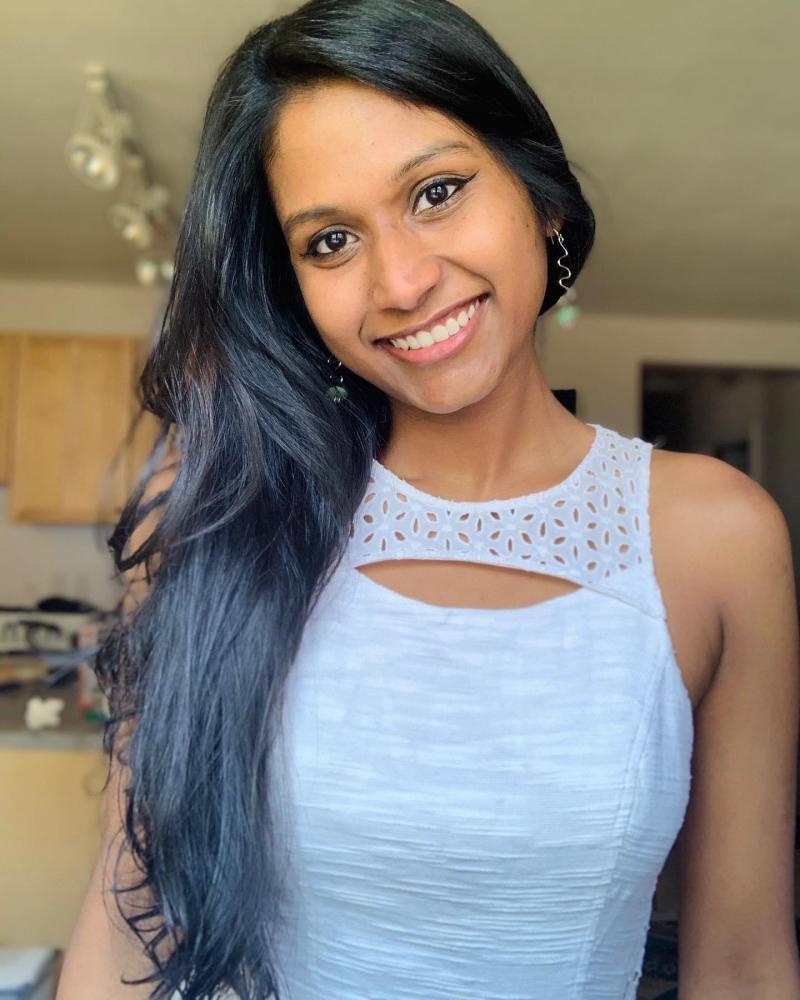Data
You will be redirected to cenamweb.org in 15 second(s). The JINA-CEE website is not updated anymore. The archived website can still be reached through the CeNAM website.
JINA-CEE Faces: Interview with Sanjana Curtis

A passionate science communicator and advocate for underrepresented groups in science, Sanjana Curtis shares with us details about her scientific journey and gives us a glimpse into her work in theoretical astrophysics. She is a postdoctoral researcher at the University of Amsterdam, but is currently based in sunny California where she is a research fellow at the University of California Santa Cruz.
How did you decide to pursue a career in science?
- I was always driven by an innate curiosity to figure out how things worked, but growing up I wasn't aware of physics as a career. I went to college to study electrical engineering and it was during that time when I realized that what I really wanted to do was physics. My mission was then to find a graduate program that would accept someone with a bachelor degree that wasn't physics. After graduating from PES University in India, I moved to the US to study my PhD at North Carolina State University. While in grad school, I tried a few different things but astrophysics was the one that really captured my attention, and decided to join Carla Fröhlich's group to do research on core collapse supernovae.
How do you interact with JINA-CEE?
- Carla introduced me to JINA when I was a student, and since then, I have participated in multiple conferences, workshops, and seminars, for some of which I received JINA travel support. These have facilitated interactions with collaborators considerably. I have also contributed science highlights to the Newsletter. All these have been great resources for me in the sense of community forming and professional development.
What is the focus of your research?
- Connecting the results of calculations to observations of very complex, multi-physics systems like core collapse supernovae, or neutron star mergers, or disks around black holes. I make these connections to observations by predicting nucleosynthesis yields and electromagnetic emission that one would expect to observe.
What’s your favorite part of your job?
- I think that what makes my job unique is the fact that I get to think very intensely about topics that are interesting just for the sake of understanding how the universe operates on a fundamental level. Also, I like the fact that there are people around me who care about thinking intensely about these topics as well, and we can talk about them and work together.
What do you consider has been your most important scientific finding so far?
- Early in my PhD we were looking at the material that is ejected from core collapse supernovae, and by carefully studying how neutrinos interact with this material we were able to understand that the neutrinos can change the proton to neutron ratios, which in turn changes the isotopes produced by the explosion. I thought it was very interesting and compelling to be able to show that carefully accounting for the neutrino physics led to yields from theory matching observations better, and across a large sample of simulations.
- A second one is my most recent paper about outflows of highly magnetized neutron stars. These ejecta could help us understand the blue component of the observed electromagnetic emission from a neutron star merger like GW170817, and how future observations would look.
What advice can you give to junior researchers?
- I think it is important that you work with people who are supportive, which applies not only to your PhD advisor but also to collaborators and peers. It makes for a much more joyful experience to work with people who care about you and who want your success. As a student, I think this is more important than the topic you chose to work on. Also, it is OK to be yourself in the sense that you don’t need to fit a particular mold of what other people think a scientist should be. This can be difficult, at times it can feel like you don’t belong or that you can’t be successful but you have to remember that there is more to life than a very linear path to a successful career.
What do you do when you are not doing physics?
- I have plenty of hobbies, most of which I enjoy outdoors, like running, hiking and roller skating. I also enjoy painting in watercolors. I am also very active in science communication and have exciting projects coming out soon!
